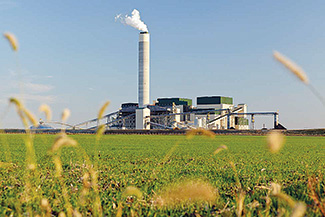By CARL GREEN
Illinois Correspondent

Springfield, IL – Illinois legislators have agreed on a compromise energy bill that will allow two union coal-burning plants in downstate Illinois to continue operating, with installation of scrubbers, while also protecting Chicago-area nuclear plants and expanding access to job training.
Labor leaders in southern Illinois had feared that the coal plants would be shut down, resulting in the loss of hundreds of good jobs and diminished power supplies for residents.
State Rep. Jay Hoffman (D-Swansea) a sponsor and lead negotiator on the bill, Senate Bill 2408, said it resulted from bringing together unions, environmentalists and the business community.
“By bringing everyone to the table, we were able to protect Illinois jobs and ensure energy needs are met while we transition to renewable energy,” Hoffman said. “The energy industry has long been at the heart of our economies in the Metro-East and southern Illinois, and has created good-paying jobs and a strong middle-class life for so many.
“So as that industry continues to evolve along with national and global trends, we need to protect these local jobs and create new training opportunities that keep our communities on the cutting edge.”
SPECIAL SESSION
The bill was approved 83-33 on Sept. 9, in a special session of the House of Representatives, with only Republicans voting against it and was passed in the Senate 37-17 on Monday. It grew out of a previous proposal, Senate Bill 18, that could have led to shutdowns of the coal plants and loss of jobs.
“The energy industry is on the brink of major changes, and as that happens, we need to ensure that no one loses their livelihood – by creating new high-paying jobs in the Metro East and southern Illinois,” said Hoffman.
In the revised bill, the coal plants, Prairie State Energy Campus, near Marissa in St. Clair County, and City Water Light and Power, Springfield, have until 2045 to become 100 percent carbon free, while emissions must be reduced by 45 percent by 2035. The previous bill lacked the emissions requirement and would have allowed the plants to pollute at current levels until 2045. Prairie State has about 600 workers.
The new bill also requires closure of all private coal-fired and oil-fired electric generating units by Jan. 1, 2030, and both private and municipal gas-fired generators by 2045 unless they achieve zero-carbon emissions. It provides up to $200 million to Prairie State to help it finance emissions reductions, possibly including carbon capture and sequestration.
ELECTRIC CAR REBATE
Meanwhile, the bill has an item for anyone who drives – a revision of the Alternate Fuels Act to create a $4,000 rebate for consumers who buy electric vehicles, to meet a goal of a million electric cars by 2030.
The Illinois Environmental Protection Agency will help pay for charging stations, with prevailing wages for construction, and the agency will have an electric vehicle coordinator.
The law goes on for pages and the new law literally rewrites the state’s energy laws.
CLIMATE JOBS SUPPORT
The Labor coalition Climate Jobs Illinois reviewed the legislation and came out in favor of it.
“The legislation sets the strongest clean energy labor standards in the country, requiring Project Labor Agreements on all utility-scale wind and solar projects and sets prevailing wages for non-residential projects,” the group said. “These provisions will raise the standard for other states seeking to enact new labor and employment policies for building and maintaining clean energy developments.
“The bill will create thousands of new clean-energy union jobs, expand union apprenticeships for Black and Latinx communities, increase energy efficiency for public schools and safeguard thousands of union workers at the state’s nuclear plants that currently generate the bulk of Illinois’ zero-emissions energy,” the group said.
“We applaud the hard work of everyone who has come to the table to debate these issues for months, and we’re committed to getting this bill signed and getting to work to build a cleaner, fairer future for all Illinoisans.”
NUCLEAR AND RENEWABLE ENERGY
Among other measures in the legislation, every five years, starting in 2025, the Illinois EPA, Commerce Commission and Illinois Power Agency will jointly conduct a study on progress toward renewable energy resources development goals and the status of electric resource adequacy and reliability throughout the state.
For nuclear plants, $694 million in financial support will be provided over five years to the Byron, Dresden and Braidwood plants, also keeping the LaSalle plant viable.
For renewable energy, the Illinois Power Agency Act will be updated to double the state’s investment in renewable energy and put it on a path toward 40 percent renewable energy by 2030 and 50 percent by 2040.
Ameren will be permitted to establish one or two utility-scale solar pilot projects.
Schools will be allowed to lease property for more than 25 years to support renewable energy projects.
Residents who generate their own electricity will be protected from financial repercussions by municipal and cooperative electric providers.
JOB TRAINING
The job training section – a special project for Hoffman – is extensive and includes a clean energy contractor incubator program to provide access to low-cost capital, a returning residents clean jobs training program for individuals who are currently incarcerated, and a jobs and environmental justice grant program to provide capital to support community ownership and development of renewable energy projects.


